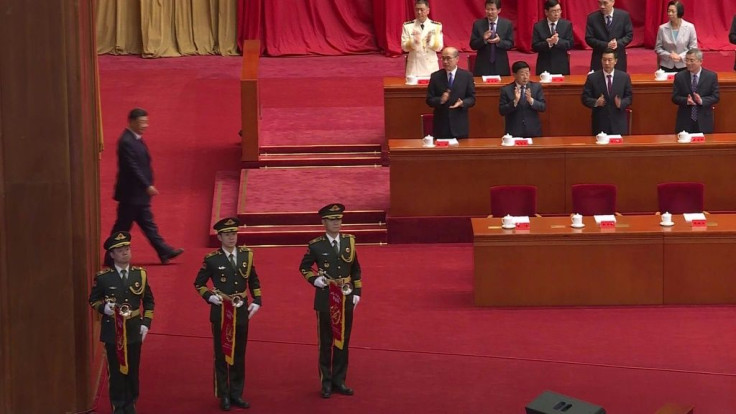China’s Xi Seeks Closer Europe Ties Closer But EU Presses Beijing To Open Markets, Improve Human Rights

KEY POINTS
- EU leaders asked Xi to open up Chinese markets, improve China’s human rights record
- EU wants China to relax the crackdown in Hong Kong
- The EU and China have been in talks since 2013 on a bilateral investment agreement
China's President Xi Jinping is seeking to strengthen his country’s ties with the European Union amid sustained tension with the U.S.
Speaking at a virtual summit on Monday, Xi called for a peaceful coexistence, mutual cooperation and multilateralism between China and its largest trading partner, the EU.
Xi further said China and the EU should develop and promote a comprehensive strategic partnership -- especially as the COVID-19 pandemic has upended global economies.
In a direct rebuke of the U.S., China’s state-controlled Xinhua news agency commented “certain countries and political forces keep playing the blame game, clamoring for 'decoupling,' and pulling out of international organizations and agreements. What they are doing is sabotaging international cooperation, stoking confrontation between ideologies and social systems, and putting the world in jeopardy.”
In contrast, Xinhua said, it is “high time China and the EU should strengthen mutual political trust, promote cooperation and advance relations.”
However, in response, EU leaders asked Xi to open up Chinese markets, improve China’s human rights record and relax the draconian security crackdown in Hong Kong.
“Europe is a player, not a playing field,” said European Council President Charles Michel.
“We are really serious about having access to the Chinese market and tearing down the barriers,” said European Commission President Ursula von der Leyen.
German Chancellor Angela Merkel said she pressured Xi to commit to an investment agreement between China and EU that would lead to China opening up its markets further.
The EU and China have been in talks since 2013 on a bilateral agreement that would ease Chinese restrictions on European companies.
“We put on pressure ... to make progress on the investment agreement,” Merkel said. “Overall, cooperation with China must be based on certain principles: reciprocity, fair competition. We are different social systems, but while we are committed to multilateralism, it must be rules-based.”
Merkel added that the relationship with China is also about protecting Europe's strategic interests. "In the last 15 years, China has become much stronger economically -- that means the demand for reciprocity, for a level playing field, is of course today very much justified," Merkel said.
The EU, like the U.S., has a long list of economic grievances against China including the overproduction of steel and theft of Western intellectual property.
“China has to convince us that it is worth having an investment agreement,” von der Leyen said. “We need China to move.”
The EU also wants China — the biggest polluter on the planet — to increase its efforts in fighting climate change.
Germany last week condemned comments made by Chinese Foreign Minister Wang Yi who attacked a Czech diplomat for visiting Taiwan.
During a five-nation tour of Europe, Wang threatened that the Czech Senate President Milos Vystrcil would pay a “heavy price” for going to Taipei and meeting with the Taiwanese president.
In response, Merkel’s Minister of Foreign Affairs Heiko Maas defended Vystrcil and criticized Wang.
“We as Europeans act in close cooperation -- we offer our international partners respect, and we expect the exact same from them,” Maas said. “Threats don’t fit in here.”
The French foreign ministry called Wang’s comments "unacceptable," while Slovakia President Zuzana Caputova tweeted: “Threats directed at one of the EU members and its representatives contradict the very essence of our partnership and as such are unacceptable.”
During his five-nation tour of Europe, Wang ruffled other feathers. In Norway, he said that protesters in Hong Kong should not receive the Nobel Peace Prize.
© Copyright IBTimes 2025. All rights reserved.





















